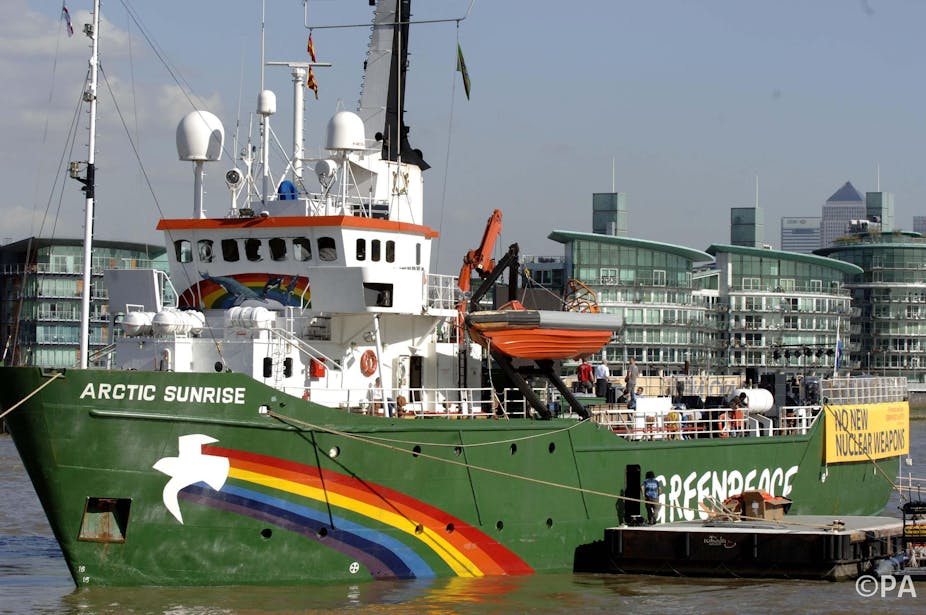Last week several Greenpeace activists bearing ropes and posters attempted to board Gazprom’s oil platform, the Prirazlomnaya, in the Russian exclusive economic zone. They did so in an inflatable craft launched from the Greenpeace vessel the MV Arctic Sunrise. They were soon arrested by the Russian Coast Guard (who allegedly rammed the inflatable craft, threatened activists at knife-point and fired 11 artillery shots across the bows of the inflatable in the process).
The Russian Coast Guard boarded the next day, within their exclusive economic zone but outside territorial waters, the Arctic Sunrise (a Netherlands flagged vessel) and arrested those on board. It was first announced that Russian authorities were preparing a piracy prosecution (maximum sentence 15 years) against all those detained, at least until President Putin declared they were “obviously not pirates” but that their attempt to “take over” the rig clearly violated international law.
Protesters vs pirates
The incident raises several questions: did any of the protesters commit piracy? Did they commit a crime under international or Russian law? And was there any legal basis for seizing the Arctic Sunrise?
The answer to the first question is a simple no. The UN Convention on the Law of the Sea 1982 defines piracy as requiring “an illegal act of violence committed, for private ends, from a private ship or aircraft” that is “directed against another ship or aircraft on the high seas (or occurring in a place outside the jurisdiction of any state)”.
There is no evidence of violence by the protesters, and their actions were targeted not at a ship or aircraft but a fixed platform on the continental shelf. The fixed platform is also not a “a place outside the jurisdiction of any state”. If the platform within the Russian exclusive economic zone or attached to the Russian continental shelf it is subject to Russian law and jurisdiction.
There is also a commonly made argument that political protesters cannot be pirates because they have political motives and are therefore not acting “for private ends”. It is a view I think is mistaken. The point of the law of piracy is to prohibit non-state violence on the high seas (for example, the law of the sea says warships cannot commit piracy unless they mutiny).
The recent court case of Cetacean Research v Sea Shepherd was, in my view, right in principle to hold that sufficiently violent acts of political protest may constitute piracy. Nonetheless, the point is not salient here. The actions of Greenpeace are not remotely colourable as piracy.
Threats to safety
Did the protesters commit other offences under Russian or international law? Quite possibly. International law allows states to declare safety zones of 500m around fixed platforms such as oil rigs and once aboard such fixed platforms you are subject to the law of the coastal state. The attempt to board the oil platform probably infringed applicable safety laws.
Going further than that, however, President Putin has said the protesters did try to take the rig over, thus violating international law. This should worry Greenpeace. An attempt to unlawfully seize or exercise control over a fixed platform by force, threat or means of intimidation is an offence under the Protocol for the Suppression of Unlawful Acts against the Safety of Fixed Platforms Located on the Continental Shelf 1988. These are deemed to be offences of a “grave nature” punishable by “appropriate penalties” under the parent treaty, the Convention for the Suppression of Unlawful Acts against the Safety of Maritime Navigation 1988.
It is fairly dubious that the protest involved force, threats or intimidation – but President Putin’s words could indicate an intention to bring serious charges based on threats to safety.
Capture the flag
Was there any legal basis for Russia seizing the Arctic Sunrise? Perhaps. On the high seas a state is generally subject to the exclusive jurisdiction of its flag state (the state under whose laws the vessel is registered or licensed) and boarding by foreign law enforcement officials is only permitted in limited cases, including piracy.
However, offences committed within an exclusive economic zone are different. Where small boats go out from a larger vessel and infringe the laws or regulations of a coastal state, the law of hot pursuit allows that vessel to be pursued and arrested. The rule extends to safety zones around a fixed platform. Even if the Arctic Sunrise never entered the safety zone, so long as one of its inflatables was still present there, Russia had – potentially – a right of pursuit and enforcement. But the law of hot pursuit is quite technical and such a boarding is only valid if preceded by a visual or auditory signal. On Greenpeace’s account the Arctic Sunrise was apparently boarded by helicopter without warning.
It is certainly open to the Netherlands, as the Arctic Sunrise’s flag state, to query the legal basis for the arrest of its vessel. However, it will have trouble raising such claims before an international tribunal as Russia has entered a (perfectly valid) reservation to UNCLOS excluding disputes concerning law-enforcement activities from the scope of the convention’s dispute settlement system.

